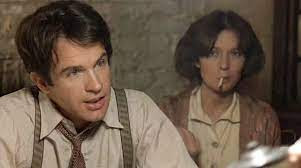Reds
“Reds” is
Warren Beatty’s biopic on John Reed and Louise Bryant, two people I had never
heard of before, but who appear to have been two central characters in the socialist
movement in the States in the second decade of the twentieth century. When I
say it is Warren Beatty’s movie, I mean it quite literally. He was director,
producer, screenwriter and lead actor on the movie. That pretty much makes it
his.
John Reed
(Warren Beatty) and Louise Bryant (Diane Keaton) meet in Portland, Oregon in
1915. Louise is a suffragist, and a journalist and John is a journalist just
returned from the war in France. His reluctance for America to join the war
piques Louise’ interest and before they know it, they are having an affair and
Louise moves in with John in New York.
From here
on the movie follows two tracks. One is the stormful relationship between the
two of them. Both are idealists, including free love, and both find it hard to
reconcile those ideals with a relationship. I lost count on the number of times
they rushed out on each other, only to get reunited. This includes an affair
with Gene O’Neill (Jack Nicholson).
The second
track is the political and journalist work of Louise and John. What I
understand is that John is a journalist for a left-wing newspaper and covering things
like labor unions and the political process, first pursuing the anti-war position
that Woodrow Wilson got elected on (and then abandoned) and then the socialist
parties, which he got more and more involved in. At the time of the Russian
revolution, he went to Russia to cover that event and his book about it became
something of a bestseller (“Ten Days That Shook the World”). From then on, John
is gripped by revolutionary fire and gets himself personally involved in the
revolutionary wing of the American socialist party, which in turn splinters
into fractional conflict. John returns to Russia to get his branch endorsed by
the Russians, but gets stuck there in the ensuing civil war.
Meanwhile,
Louise is pursuing her professional career with extensive writing, but except
for the opening hour, it is a bit diffuse what she is actually doing and how successful
she is at it. In terms of the movie, she increasingly becomes the spouse who is
sacrificed on the fire of revolution.
I am a bit vague
here because “Reds” suffer from the illness of most such movies. It is supposed
to be about the work of these two people, but it seems like the authors (Warren
Beatty?) thought that the topic would be way too complicated for its viewers,
so it is always reduced to “something socialist” involving workers, progressive
thinking and bloody revolution. The story of their professional work seems to
have been plenty dramatic and with huge implications for the development of
modern United States, but I am left with tons of questions here and the message
that I am probably not smart enough to understand it anyway. Instead, the movie
fills in a lot of human-interest elements, again a classic, because THAT we
will understand. This takes up a lot of space and I am certain that Louise’
affair with Gene is way more important than the articles she wrote and her
influence on the suffragist cause. That was sarcasm, by the way.
“Reds” is
not a documentary, but Beatty frequently includes statements from people who
were there and witnessed what went on. This lends a lot of authenticity to the
story and is a nice touch. Tom Hanks did something similar to his “Band of
Brother” with the same effect. I definitely liked it, but it was rare that it
told me something I did not already get from the movie itself.
This is a
very long movie, more than three hours long, and it has a lot of story to tell.
I do not mind that, as long as there is a story and the second half is
certainly dramatic enough to provide material for it. It is also here we get
closest to learning what this is all about, which makes it the best part of the
movie, but alas, only in snippets.
The subject
matter is interesting, it is a story I never heard before and that alone tickles
my interest. I am not particularly political myself, but it is people like
these who shape the world, and their stories are worth telling. I just wonder
if I would have preferred a documentary.
“Reds”
harvested three Academy Awards for Best Director, Best Supporting Actress
(Maureen Stapleton) and Best Cinematography.

I would have absolutely preferred a documentary. It's hard not to be impressed with this as an undertaking, but I'd need a gun to my head to want to watch it again.
ReplyDeleteMy feelings exactly. S great achievement but not one I would like to sit through again
Delete